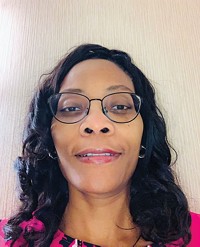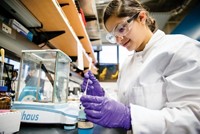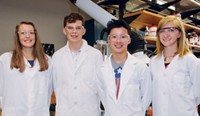Advertisement
Grab your lab coat. Let's get started
Welcome!
Welcome!
Create an account below to get 6 C&EN articles per month, receive newsletters and more - all free.
It seems this is your first time logging in online. Please enter the following information to continue.
As an ACS member you automatically get access to this site. All we need is few more details to create your reading experience.
Not you? Sign in with a different account.
Not you? Sign in with a different account.
ERROR 1
ERROR 1
ERROR 2
ERROR 2
ERROR 2
ERROR 2
ERROR 2
Password and Confirm password must match.
If you have an ACS member number, please enter it here so we can link this account to your membership. (optional)
ERROR 2
ACS values your privacy. By submitting your information, you are gaining access to C&EN and subscribing to our weekly newsletter. We use the information you provide to make your reading experience better, and we will never sell your data to third party members.
Careers
Project SEED: Does It Work?
by J. Philip Bays, Chair, Committee on Project SEED
August 27, 2007
| A version of this story appeared in
Volume 85, Issue 35

As we prepare for the 40th anniversary of Project SEED next year, it is time to ask how the program has performed. On April 2, 1968, the ACS Council adopted a resolution calling on the society to take appropriate steps to help underprivileged segments of the nation's population. Project SEED, the program undertaken in May 1968 by the ACS Committee on Chemistry & Public Affairs (CCPA) to implement this action, was an unprecedented effort by ACS to strike at the root causes of the societal crisis—lack of education and unemployment.
What began with 10 students that summer has grown substantially. In its four decades, Project SEED has introduced more than 7,400 students to their first summer research experience. In 1992, Project SEED II, which provides an opportunity for a second summer of research, was introduced. More than 1,200 students have participated in SEED II. In 1993, the SEED college program was instituted, providing $5,000 scholarships to outstanding SEED participants entering college. To date, 340 scholarships have been awarded.
Project SEED could not succeed without the participation of ACS members. You have served as mentors for students, supervising their summer research projects. You have served as coordinators, organizing the SEED programs in your geographical areas, matching students with mentors, and providing advice and support to students. Many of you have contributed financially to support the program, both through personal donations and the dues check-off. Project SEED could not function without each of you!
But these are only numbers. The real measures of success lie in the students' stories. The best way to tell you about these is in the students' own words.
Ranked fourth in a class of 330 at Union High School, in New Jersey, Carlos Campoverde participated in Project SEED and was mentored by Calvin Strand at Jersey City Medical Center. Carlos writes: "Project SEED has allowed me to broaden my ideas of what I would like to be someday. Working in a medical center in the chemistry department, I saw firsthand what chemists and biochemists do in their jobs. It made me see that I would love someday to do the same thing these men and women do. I thank the American Chemical Society for opening doors of opportunities for me, and I promise you that someday you will be proud of my achievements." We already are. He will be pursuing a biochemistry major at Montclair State University, in New Jersey.
Sarann Kong will study chemical engineering as a college student at the University of Massachusetts, Lowell. A graduate of Lowell High School, she participated in Project SEED at the Center for Green Chemistry at the University of Massachusetts with mentor John Warner. Of her experience she writes: "Project SEED has provided me with a great opportunity to build my foundation by performing experiments and using laboratory equipment. As a result, I've decided to choose chemical engineering as my major study. After completing my degree, I intend to work for any industries using green chemistry to produce products."
Chenee San Marcos plans to study pharmacy after graduating from Stagg High School in Stockton, Calif. She performed carbohydrate syntheses in the laboratory of her SEED mentor, Andreas H. Franz, at the University of the Pacific, in Stockton. "Project SEED has helped me financially because the stipend I received over the summer is helping me finance my senior year [in high school]. I also used part of the money to help my family back in the Philippines, and half of it is still in the bank for future expenses. The program made a bigger impact on my career choice. I found chemistry to be so amusing and interesting that I would like a career that is chemistry related," she writes. She intends to major in chemistry at the University of the Pacific.
Zeliang Zheng, from Manhattan International High School, was mentored by Philip Lukeman at New York University. Zeliang writes: "I am a student who is always curious about nature and the way it functions, and Project SEED allowed me to explore my curiosity. It confirmed my career goal of being a scientist." Working on a project involving DNA structural modifications, Zeliang learned to use atomic force microscopy. This fall he will attend Union College, Schenectady, N.Y., where he intends to major in biochemistry.
Project SEED has clearly made a difference. These are just four representatives of our current scholarship recipients; I could cite many more. Unfortunately, as students move from the SEED program into college or work, we lose track of them. Home addresses and e-mail accounts change. It would be wonderful to hear stories of what has happened to those who were SEED participants five, 10, 20, or even 39 years ago. If you are one of those, please consider contacting the Project SEED office at ACS, or e-mailing me at pbays@saintmarys.edu. Tell us your story!
And to all ACS members, join with us throughout 2008 in celebrating our 40th anniversary. Be a mentor, and support this successful program with your financial contributions.
Views expressed on this page are those of the author and not necessarily those of ACS.





Join the conversation
Contact the reporter
Submit a Letter to the Editor for publication
Engage with us on Twitter